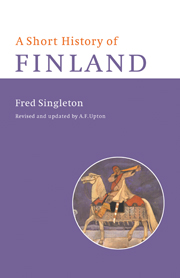Book contents
- Frontmatter
- Contents
- List of maps
- Dedication
- Preface
- 1 HISTORY OF FINLAND
- 2 FINLAND AND SWEDEN
- 3 FINLAND, SWEDEN AND RUSSIA IN THE EIGHTEENTH CENTURY
- 4 THE FINNISH NATIONAL AWAKENING
- 5 THE FINNISH ECONOMY IN THE NINETEENTH CENTURY
- 6 THE POLITICAL DEVELOPMENT OF FINLAND, 1863–I917
- 7 INDEPENDENT FINLAND
- 8 FINLAND IN THE SECOND WORLD WAR
- 9 FINLAND IN THE POST-WAR WORLD: THE POLITICAL SITUATION
- 10 THE ECONOMY OF FINLAND IN THE TWENTIETH CENTURY
- 11 THE SPIRIT OF FINLAND
- Appendices
- Bibliography by John J. Horton
- Index
4 - THE FINNISH NATIONAL AWAKENING
Published online by Cambridge University Press: 28 January 2010
- Frontmatter
- Contents
- List of maps
- Dedication
- Preface
- 1 HISTORY OF FINLAND
- 2 FINLAND AND SWEDEN
- 3 FINLAND, SWEDEN AND RUSSIA IN THE EIGHTEENTH CENTURY
- 4 THE FINNISH NATIONAL AWAKENING
- 5 THE FINNISH ECONOMY IN THE NINETEENTH CENTURY
- 6 THE POLITICAL DEVELOPMENT OF FINLAND, 1863–I917
- 7 INDEPENDENT FINLAND
- 8 FINLAND IN THE SECOND WORLD WAR
- 9 FINLAND IN THE POST-WAR WORLD: THE POLITICAL SITUATION
- 10 THE ECONOMY OF FINLAND IN THE TWENTIETH CENTURY
- 11 THE SPIRIT OF FINLAND
- Appendices
- Bibliography by John J. Horton
- Index
Summary
The establishment of the Grand Duchy of Finland under the authority of the Russian Tsar came at a time when throughout Europe nations which had previously been submerged within the framework of large, multinational empires were awakening to the realization of their distinct cultural identity. The work of Vuk Karadžić among the south Slav peoples, within both the Habsburg Monarchy and the Ottoman Empire, had kindled the spark which awoke in the educated classes the realization that they were heirs to a tradition which had its roots amongst the ordinary people and owed nothing to their German, Hungarian and Turkish overlords. The language, the cultural traditions and the feeling of a distinct national identity owed much to the survival of oral traditions which had been passed on for centuries amongst people who had no written language. In the second half of the eighteenth century scholars such as Herder and the brothers Grimm and poets like Goethe and Schiller propagated the view that a nation must possess a language and a literature which was based on the culture of the ordinary people. From Greece to Finland and from Spain to Slovakia the peoples of Europe were encouraged to seek the origins of their national culture in the folk traditions of the peasantry. The spread of this concept and its translation into political terms owed much to the influence of Napoleonic France and to the ideas of Rousseau and the French Encyclopaedists, who helped to create the intellectual climate in which the French Revolution germinated.
- Type
- Chapter
- Information
- A Short History of Finland , pp. 69 - 81Publisher: Cambridge University PressPrint publication year: 1998



